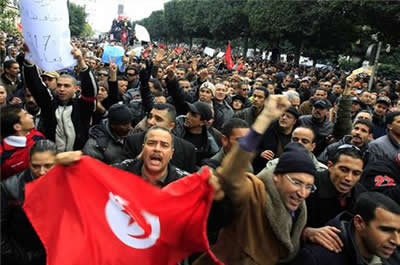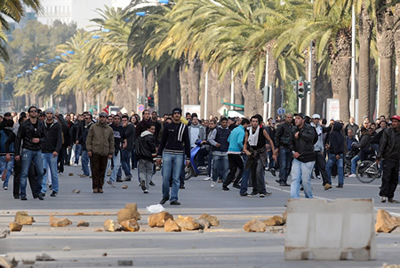Internet Statement 2011-01
The National Uprising in Tunisia
Uwe Müller 23rd January, 2011
At the moment the whole world is looking at Tunisia in great expectation and this with reason. Triggered by the self-burning of the 26-year-old Mohamed Bouazizi on the 17th December the protest and the rebellion against the corrupt, mafiotic, subversive and dictatorial regime have spread from the inner country and set the whole country into upheaval and frightened and scared the regime. The brutal terror of the police with determined killings of demonstrators, plundering and arsons could not stop the uprising of the mainly young popular masses.
The national uprising in Tunisia has won the palm/gained the
day - Ben Ali and his wife have left the country in refuge on
the 14th January and have gone into exile in Saudi Arabia. The Ben-Ali
regime is finished. This is a great success of the Tunisian people having
effects not on the Arabic states only and will have.
In Tunisia the youth is rebelling, a whole generation, against the massive unemployment and above all against the lack of perspective going along with it. It rebels against the arbitrary rule, against the absence of rights and against the now unbearable corruption and limitless enrichment addiction of the regime. In Tunisia there are hundred thousands of young, well educated people with higher education qualification, who nevertheless do not find any work and have to keep their barely above water with precarious minor jobs (the so-called "chômeurs diplômes"). Only those who have good relationships and has submitted completely to the system, could have hope for a placement in the state apparatus and find an education relevant work in the economy broadly dominated and controlled by the regime.
It is not accidental that the uprising has been ignited by the self-burning of the Mohamed Bouazizi. The 26 year old had to give up his studies in order to earn money for his family. With great difficulty he coped as a seller of fruit using his wheelbarrow. Repeatedly he was chicaned by the police because of a missing license and robbed of the goods or put off with punishments. Until he could simply not bear this arbitrariness and hopelessness any longer. The population could understand this very well as many of them are a in a very similar situation. A regime that leads young people to such acts of despair - must go! This seemed to be the general tenor. A 15-year-old was quoted expressing his aims with the short formula "We want freedom, bread and work!".
In addition to all the lack of perspective of many young people there are the consequences of the world financial crisis and the increase of food prices. Even to those who have work in manufacture, in agriculture or in tourism life, rather survival, becomes ever more difficult. The level of income is low; the average income is about just 250 Euro, the official minimal income at about 100 Euro.
Ben Ali has fled. Yet, the forces of the regime have not been beaten
completely so far. The quickly formed transition government to be in charge
until the elections fills the decisive positions with affiliates of the
regime and the RCP just as before. There is no sign of democracy, not
even in a bourgeois sense. The protests persevere unabatedly; the struggle
about the future of the country goes on. And this is necessary. The militias,
the police in uniform and the civil police of Ben-Ali are still marouding
in the country, plunder and shoot about them and try to spread fear and
chaos. However, the people know how to defe nd.
Everywhere civil militias, so-called watch committees, have been founded
and control and try to protect their town sections.
nd.
Everywhere civil militias, so-called watch committees, have been founded
and control and try to protect their town sections.
The corrupt arbitrary regime has been overthrown. That is good, but just the beginning. What are the political forces pushing forward the democratic and social movement (or revolution) in Tunisia now? What are their aims?
What programs, what concepts do the various parties and organisations have for the development of the country? Which social classes do they represent?
During the overturn of the regime Islamists did not play any major role, will this maintain? What role does the army take up? So far it has been on the side of the people.
What role do the trade unions play? It says, they are in charge of strong organisational positions (the trade union UGTT is said to have 500.000 members) and has contributed a lot to the success of the national uprising. However, their leadership has cooperated with the regime for years. The 3 ministers on the side of the UGTT at least having been among the transition government at the beginning have left because of massive protests of the trade union.
Which workers' parties or communist parties are there in Tunisia and what position do they represent? The maybe most influential party is supposed to be the so far banned PCOT with the chairman Hamma Hammami.
What politics concerning Tunisia are the foreign supporters of the old regime (EU, France/Italia, USA and so on) now pursuing?
A whole lot of questions which could not be answered from here and so
quickly. Many things will show only in the further development and dispute.
Yet, one can say just one thing for sure: The struggle about/fight
for democracy and the social struggle about perspectives for the youth
and for the people has not finished yet. It has just begun and will be
continued also in Tunisia.